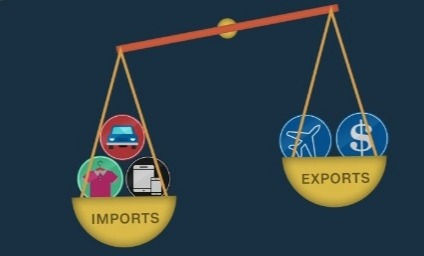
The forecast of CAD to widen to $25-30 billion in the third quarter itself, exceeds the full-year deficit recorded in the pre-pandemic year of FY20. Still, it would remain well within control, said a senior official.
Merchandise exports rose 27.2% in November from year before but almost 57% surge in imports inflated trade deficit to a record $22.9 billion last month, according to the provisional estimate released by the commerce ministry on Tuesday. The November deficit is not just double the level witnessed a year before also significantly higher than the November 2019 mark. This is a “cause for concern regarding the implications for the size of the current account deficit (CAD) in the second half of this fiscal”, according to ICRA chief economist .
Having hit a monthly record of $35.7 billion in October, merchandise exports dropped to $30 billion in November, as fresh supply bottlenecks across the globe, including a spike in shipping costs and container shortage, hurt exporters’ ability to ship it out. Nevertheless, exports registered a 16.6% rise from the pre-pandemic (same month in FY20) level to $30 billion. However, imports shot up by 37.4% from the pre-Covid level to $52.9 billion.
Of course, imports were driven partly by a spill-over of pent-up domestic demand that remained mostly muted in the wake of the pandemic. But import bill was greatly inflated by elevated global crude oil prices and massive purchases of coal, cooking oil and gold. Importantly, if the emergence of a new Covid variant in South Africa spread rapidly to other countries, especially a key market like Europe, the growth momentum, witnessed in merchandise exports in recent months, could come under pressure.
Exports this fiscal have been supported by strong order flow from key markets such as the US and China, thanks to an industrial resurgence there and elevated global commodity prices.Imports of coal, coke and briquettes jumped 136%, while those of petroleum products shot up by 132%. Vegetable oil imports rose by 79%, while gold imports continued to rise at a fast pace, by 40%. Of course, base effect, too, remained unfavourable.
A Sakthivel, president of the exporters’ body FIEO, said while the government has announced a slew of measures to support exports, “the need of the hour is to soon announce extension of the interest equalisation scheme and allow transfer of MEIS”. He called for necessary support if the new Covid variant spreads. These steps could include augmenting the flow of liquidity and setting up a regulatory authority to seek justification of imposition of various charges by the shipping lines, among others, he said.
